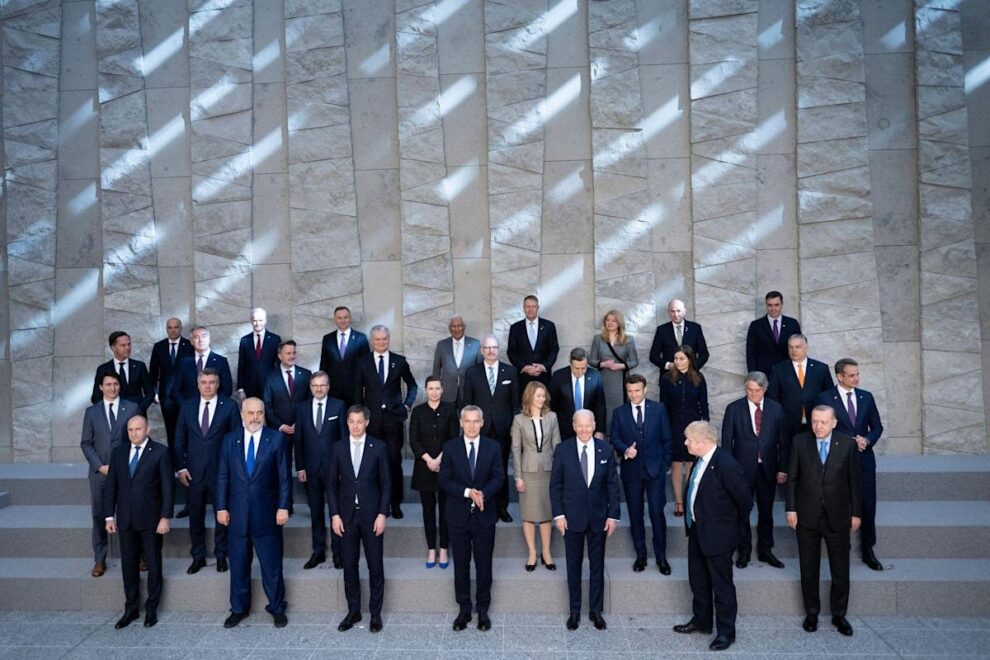
(Bloomberg) — The U.S. is working with NATO to prepare for possible biological or nuclear incidents by Russia as the world’s leading developed nations plan to warn President Vladimir Putin against deploying such weapons.
Most Read from Bloomberg
As Russia’s invasion remains stalled one month into the conflict, a senior U.S. official said Thursday that Washington is working with allies on preparation and deterrence postures over Russian weapons of mass destruction, as well as on potential medical and other countermeasures to help Ukraine. The official spoke as U.S. President Joe Biden met with NATO leaders in Brussels, one day after U.S. National Security Adviser Jake Sullivan downplayed the risks of a nuclear attack.
Group of Seven leaders plan to say that they will continue to impose “severe consequences” on Russia by fully implementing the sanctions that countries have already imposed and stand ready to apply additional measures.
“We task the relevant ministers in a focused initiative to monitor the full implementation of sanctions and to coordinate responses related to evasive measures, including regarding gold transactions by the Central Bank of Russia,” according to a draft of a joint statement obtained by Bloomberg that the leaders plan to issue Thursday.
Biden is in Brussels for a trio of summits with NATO, the G-7 and the European Union as world leaders display their unity in countering Russia’s invasion and try to come up with measure to cope with the economic fallout.
Russia has suffered punishing losses in the opening weeks of the conflict, with NATO estimates suggesting that at least 7,000 troops have died and noting the actual death toll could be as high as 15,000. The U.K. defense ministry said Thursday that Russia is likely looking to mobilize its reservist and conscript manpower, as well as private military companies and foreign mercenaries.
Ukraine, meanwhile, showed an unexpected unity and strength over the past month despite severe attacks against civilian targets and as millions of people fled their homes. President Volodymyr Zelenskiy has said Russian soldiers have killed more Ukrainian civilians than soldiers. The images of Moscow’s siege of cities like Mariupol have only galvanized Ukrainians to stage protests against Russian troops.
“We still have a very difficult period ahead of us,” Ukrainian Defense Minister Oleksii Reznikov said in Facebook post marking the first month of the war. “The Russian war machine will not stop until it is drowned in the blood of its own soldiers. The Russian society is already experiencing some of the consequences but is intimidated and passive.”
Ukraine will fight on as it will “not let anyone take our state away from us,” he added. “The state which generations of Ukrainians dreamed of, fought and died for.”
Despite the heavy losses, Putin has shown no sign of reversing of course, even as the flurry of economic sanctions imposed by the U.S., EU and the U.K. take an increasing toll. There’s growing evidence of shortages of goods in Russia as consumers start to feel the impact of sweeping sanctions.
The U.S. warnings on chemical and nuclear incidents suggests growing concern that Putin will lash out with his military suffering heavy losses. Biden, speaking at the White House Wednesday, said there’s “a real threat” that Russia will use chemical weapons.
NATO officials are studying different scenarios around Russia’s possible use of chemical agents as weapons of mass destruction, NATO officials said. A so-called false flag event could involve an accident on a chemical plant given the significant amounts of ammonia, chlorine and nitrates in Ukraine that are used in its agricultural industry.
Another scenario considers Russia using a chemical weapon that could involve a highly toxic agent delivered across a wide area, the officials said. These kinds of attacks, however, would allow immediate attribution and it’s unclear whether Russia would want to avoid that, they added.
Sullivan suggested Wednesday the U.S. doesn’t have specifics on whether Putin’s planning has changed.
“We haven’t seen anything that’s made us adjust our posture — our nuclear posture, but it’s, of course, something that we will have to continue to stay in close consultation with allies and partners on, as well as communicate directly to the Russians on,” Sullivan said.
On Thursday, G-7 nations also plan to call on other countries to enforce sanctions and refrain from providing support to Russia.
“Moreover, we urge all countries not to give military or other assistance to Russia to help continue its aggression in Ukraine,” the draft statement says.
Biden was all smiles when he arrived at the NATO summit Thursday, chatting and shaking hands with his counterparts during a pre-meeting photo-op.
But the niceties belie a challenge for the U.S. president: The summit meetings are a test of Biden’s ability to project power in the face of Russian aggression and rally allies around tougher sanctions to punish Moscow for invading Ukraine. The president is facing pressure to quickly ratchet up penalties on Moscow, as the Ukraine war enters its second month.
A day earlier, Biden warned that he saw a “real threat” that Putin will deploy chemical weapons in Ukraine.
The G-7 leaders also plan to pledge help for nations as they try to wean themselves off their dependence on Russian oil.
“We will ensure secure alternative and sustainable supplies, and act in solidarity and close coordination in the case of possible supply disruptions,” the draft says. The leaders also call on oil- and gas-producing nations to increase deliveries.
The U.S. and EU are expected to announce a deal on Friday aimed at slashing Europe’s dependence on Russia energy.
(Updates with details on attack scenarios starting in 12th paragraph)
Most Read from Bloomberg Businessweek
©2022 Bloomberg L.P.











Add Comment